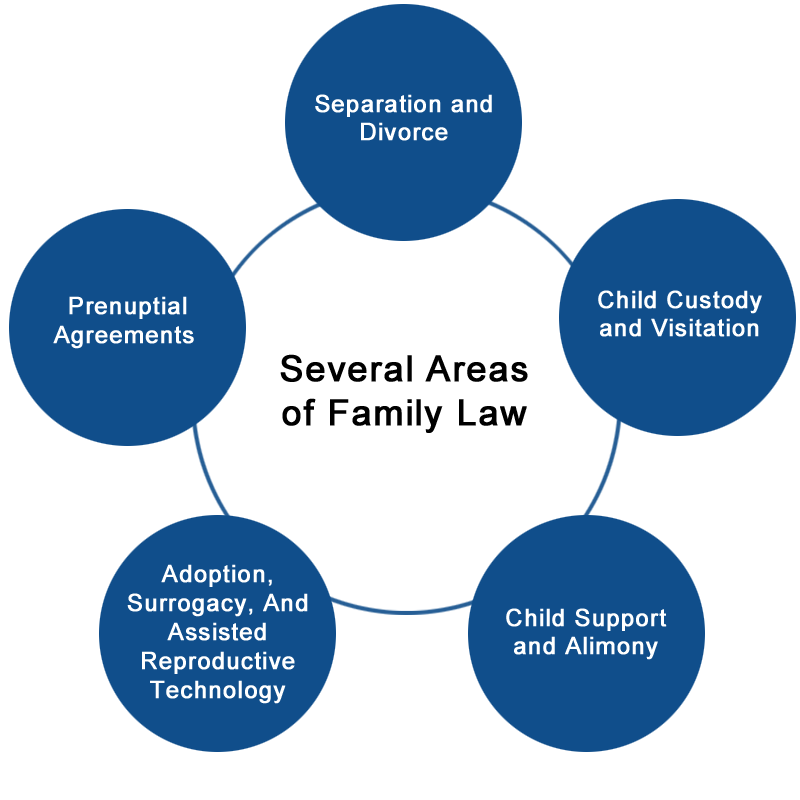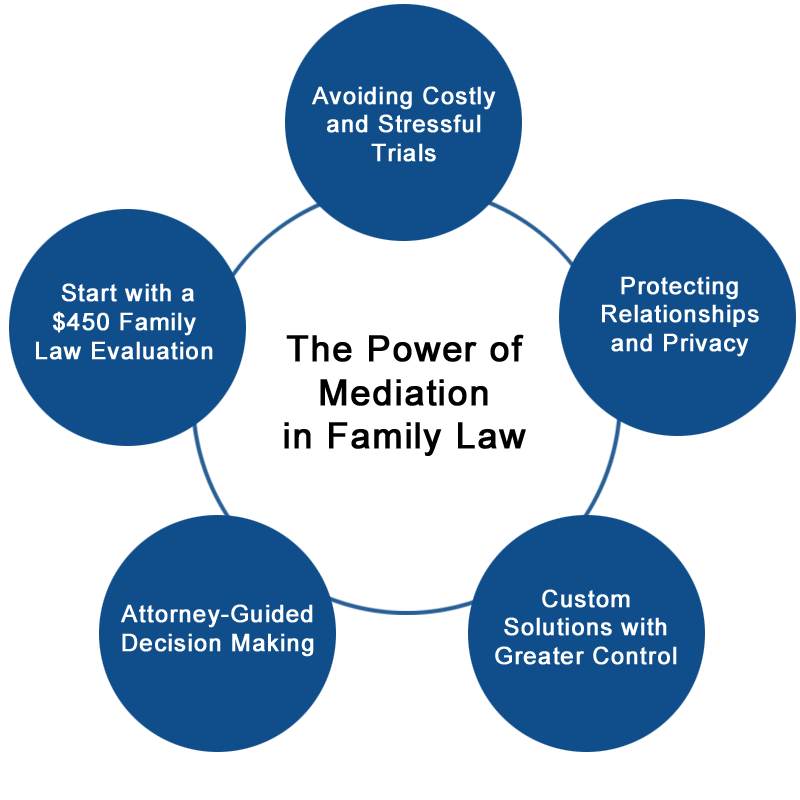Family Law
Family law cases are rarely simple, and can often represent some of the most emotionally charged, and deeply personal, legal situations a person can ever find themselves in. At The Claiborne Firm, we understand the personal and legal toll that these cases can take, so we make it our mission to ease that burden for you. We work with you to provide a full understanding of your case, giving you clarity, confidence, and most importantly, control. We let you put your focus where it’s needed – your family – while we work relentlessly behind the scenes to protect your rights, preserve your relationships, and provide for your future.

Putting You and Your Family First
It can be easy to feel overwhelmed while a family law case is argued, as legal uncertainties mount and families strain to stay intact. It’s easy to feel powerless. But our team’s sole focus, from day one, is on helping you reclaim that peace of mind. We do that by building a path through the legal morass that guides you and your family toward the best possible outcome, and a better future.
Telling Your Story
You deserve to be heard, and your story deserves to be told and understood. And in family law cases, being able to have your story told, clearly, unflinchingly, and convincingly, can often be the hinge on which the outcome sways. The Claiborne Firm helps you tell your story, advocating for you, adding our strength to yours and operating with overwhelming legal authority to pursue what you and your children deserve.
Types of Cases We Handle & FAQ
Strategically preparing for a Divorce
Separate Property
Divorce
Infidelity and Adultery (Cheating) Laws in Georgia
High Net Worth Divorce
Divorce, Contested
Contested Divorce Explained
Divorce, Uncontested
Uncontested Divorce Process
Divorce Annulments
Divorce Settlement Mediation
Division of Assets and Property
Domestic Violence and Restraining Orders in a Divorce
Divorce Legal Terms
Cheating and Infidelity in a Divorce Case
Child Testimony in Divorce Cases
High Asset Divorce
Business Valuations in Divorces
Child Custody
Determining Child Custody
Modification of Custody
Visitation Agreements
Modification of Visitation
Child Custody for Same-Sex Couples
Contempt of Custody or Visitation Orders
Parental Kidnapping
Establishing Paternity
Adoption
Legitimation
Step-Parent Adoption
Adoption for Same-Sex Couples
Surrogacy and Infertility Law
Donor Egg Agreements
Southern Surrogacy
Child Support
Modification of Child Support
Alimony
Alimony Modification
Contempt for Non-Payment
Child Modification Support Laws
Prenuptial Agreements
Prenuptial Mediation
Enforcing Prenuptial Agreements
Fighting Prenuptial Agreements

Putting in the Work
While family law is perhaps the most emotional aspect of the legal field, it also requires the same carefully focused strategy of exhaustive preparation as any other case. The side that prepares better gets to set the tone, define the narrative, and have a greater hand in the outcome. That’s why The Claiborne Firm treats every case like it’s going to trial, regardless if it’s headed for one or will simply be settled in mediation. By ensuring that every detail is analyzed, every fact is made clear, and every possibility is explored, we give you an edge in court or at the negotiating table.
 Understanding Family Law in Georgia
Understanding Family Law in Georgia
Because of its unique place at the nexus of legal, emotional and financial concerns, family law is possibly the most complex and emotionally charged area of the legal system. Navigating such deeply personal issues as divorce, domestic violence, adoption and child custody requires not just considerable legal acumen, but also the ability to be discrete and sensitive.
In the state of Georgia, the outcome of divorce, property division and custody hearings is determined by a judge, leaving your family’s fate and fortunes in the hands of someone you’ve never even met. As someone who hasn’t experienced the full emotional and financial journey your family has been on, they simply can’t fully appreciate the nuances of your situation, particularly if those nuances haven’t been clearly or persuasively presented. What’s more, court records from these cases are a part of the public record unless sealed – potentially broadcasting your personal details for all to see.
At The Claiborne Firm, we’re always sensitive to the stresses and uncertainties that a family law challenge can inflict on a family. That’s why pursue your case with informed care, protecting your rights through thorough preparation, providing peace of mind by informing and empowering you, and lifting the legal burden you are facing.
There are several areas of family law that The Claiborne Firm handles, including:
Separation and Divorce: In the state of Georgia, dissolving or even pressing pause on a marital relationship is never just a matter of walking away. The court must usually get involved to settle matters of asset division, child custody, child support and alimony. Separation, referred to in Georgia law as “separate maintenance” allows couples to live in separate homes under financial and familial terms set by the court. This is a temporary measure until the divorce is finalized. Until then, the marriage is still legally intact and bound by the court’s arrangements.
When it comes to divorce, Georgia is a “no-fault” divorce state, meaning either spouse can say the marriage is irretrievably broken, and that alone is enough to file for divorce. That said, state law does allow for fault-based divorce for circumstances such as adultery, desertion and abuse that would have an impact on the court’s rulings on alimony and child custody. To file in Georgia, at least one spouse needs to have been a resident for six months, and there is a 30-day minimum waiting period before the divorce can be finalized.
Child Custody and Visitation: In Georgia, custody and visitation refer to the legal arrangements that determine how separated or divorced parents share responsibilities for raising their children. The court breaks this down into two main types: legal custody and physical custody. Legal custody covers the authority to make important decisions about things like schooling, healthcare, and religion. Physical custody determines where the child will live for the majority of the time. Either type of custody can be granted solely to one parent or jointly between the two of them, with one parent being named the primary custodial parent.
The courts make these decisions based on what best serves the interest of the child. That means the court looks at things like each parent’s ability to meet the child’s needs, emotional bonds, the stability of each home, and, if the child is 14 or older, the child’s own preference. In most cases, the parent who doesn’t have primary physical custody is still given visitation rights, which can be flexibly structured to include holidays, summer vacation and weekends. During the divorce process, the court may issue temporary custody orders that remain in place until final arrangements are made on custody or require mediation if terms cannot be reached. They may also appoint a guardian ad litem to make recommendations to the court based on their investigation. Whatever the court ultimately decides is enforceable and legally binding, but can be modified as changing circumstances warrant.
 Child Support: In Georgia, child support refers to the financial obligation one parent has to the other following a separation or divorce in covering the costs of raising a child. To determine the amount of child support warranted, the state weights both parent’s incomes, how many children they have, and various costs such as insurance and daycare. This is called Georgia’s Child Support Guidelines, and they take several factors into account to ensure that children enjoy the same standard of living as they would if both parents stayed together. This support is typically paid to the custodial parent by the noncustodial parent, although that can change based on the parent’s income and available time, and can be adjusted for things like travel expenses incurred during visitation, the child’s medical requirements or special educational needs. These orders generally remain in effect until the child reaches adulthood and are legally enforceable through means such as wage garnishment, license suspension, and potential jail time.
Child Support: In Georgia, child support refers to the financial obligation one parent has to the other following a separation or divorce in covering the costs of raising a child. To determine the amount of child support warranted, the state weights both parent’s incomes, how many children they have, and various costs such as insurance and daycare. This is called Georgia’s Child Support Guidelines, and they take several factors into account to ensure that children enjoy the same standard of living as they would if both parents stayed together. This support is typically paid to the custodial parent by the noncustodial parent, although that can change based on the parent’s income and available time, and can be adjusted for things like travel expenses incurred during visitation, the child’s medical requirements or special educational needs. These orders generally remain in effect until the child reaches adulthood and are legally enforceable through means such as wage garnishment, license suspension, and potential jail time.
Alimony: Also known as spousal support, alimony is actual financial support paid by one party to the other following (or even during) a divorce. The amount of alimony paid, if any is ordered, is based on a number of factors from the length of the marriage to the standard of living the couple enjoyed while married, the financial resources and earning capacity each has, individual contributions to the household and whether or not any adultery or abandonment took place. While alimony is not always guaranteed, if it is ordered by the court it can paid periodically or as a lump sum, with amounts and duration set by the court. Alimony is usually ordered temporarily, but in certain cases it can be made permanent, with modifications later based on changes in financial situations.
Adoption, Surrogacy, and Assisted Reproductive Technology: Georgia law requires several pathways to legal parenthood, including adoption, surrogacy and Assisted Reproductive Technology (ART), each of which carries its own complex set of laws. In cases of adoption, which could involve a stepparent adopting their stepchild, adoption by a friend or relative, or adoption through the foster care system, the law looks to the best interests of the child above all else. Before an official adoption decree can be issued, the biological parent’s rights must be terminated unless they’ve already been relinquished, and the court must conduct background checks and home studies on potential adopters. While there are no specific statutes in Georgia law governing surrogacy, the courts will generally look to gestational surrogacy contracts, particularly when an agreement has already been reached between parents and surrogates. Court proceedings will then determine legal parentage, which can occur before or after birth. Covering a wide range of technologies including sperm or egg donation, in vitro fertilization (IVF) or embryo transfers, assisted reproduction technology (ART) is an area of the law that can get incredibly complex. Mitigating factors such as anonymous donation, presence or absence of consent, and unclear parentage can complicate matters, making it crucial to secure everyone’s rights and expectations in legal documents. Working with a family law attorney can help sidestep sensitive issues before they become disputes.
Prenuptial Agreements: Commonly referred to as a “prenup,” this is a legally binding contract that two individuals enter into before getting married, outlining specifically how assets, debts, and property will be divided in the event of divorce, separation or death. Georgia law requires that this agreement is in writing, signed with the full consent of both parties, and drafted as an honest representation of each party’s financial situation in order for it to be enforceable. This ensures that the agreement was created with the full knowledge of both parties, was not based on fraud or written under duress, and doesn’t violate public policy (waiving child support, for example).
A prenup can’t predict how future scenarios will play out, but it can protect premarital assets or inheritances, establish terms for alimony, and reduce future conflict. It is crucial that both parties seek their own independent legal counsel before entering into a prenuptial agreement.
Regardless of the area of family law, it is vital to seek an experienced attorney because of the complexity each case represents. In cases of high net-worth individuals, simple financial matters like asset division, child support and spousal maintenance can be significantly more high stakes. In cases involving children, what defines “their best interests” can become fiercely contested. Plus, these matters often overlap with areas of the law like tax law and estate planning, requiring an attorney whose knowledge base is as broad as it is deep.
 The Value of Mediation and Alternative Dispute Resolution
The Value of Mediation and Alternative Dispute Resolution
At The Claiborne Firm, we’ve seen how mediation can create best-case scenarios for our clients – giving them what they’re entitled to without the stress and expense of a full-blowing trial, while preserving family relationships so no one feels unwelcome at future family events. It’s an incredibly easy way to resolve a family law case, but it’s one we enter into with our clients’ best interests in mind. Approaching mediation with the willingness to take it to trial if need be gives us a clear path to reaching a resolution.
Because attorneys are present at every step in the process, your rights are better protected, and you are able to make more well-informed decisions. The process also gives both parties much greater flexibility in reaching a customized resolution that serves their situation, preserves their relationship with one another, keeps their private affairs out of the public eye, and gives them greater control over their own destiny. It is also far faster, easier and cheaper than a long, drawn-out court battle.
Our $450 Family Law Evaluation
Knowing that any family law case is as complex as it is emotionally weighted, The Claiborne Firm offers an easy way to speak with one of our attorneys and gain a better understanding of your case before you fully commit to working with us. During our $450 family law evaluation, we work with you under the protection of attorney-client privilege to ascertain all the facts of your case, develop our relationship with you as a client, and lay the foundation for a strategy that will protect the rights of you and your family. We will also establish our retainer fee, based on the circumstances of your case and the estimated time it will require, eliminating any uncertainty as to what lies ahead.
Call (912) 351-8775 or Contact Us Online
